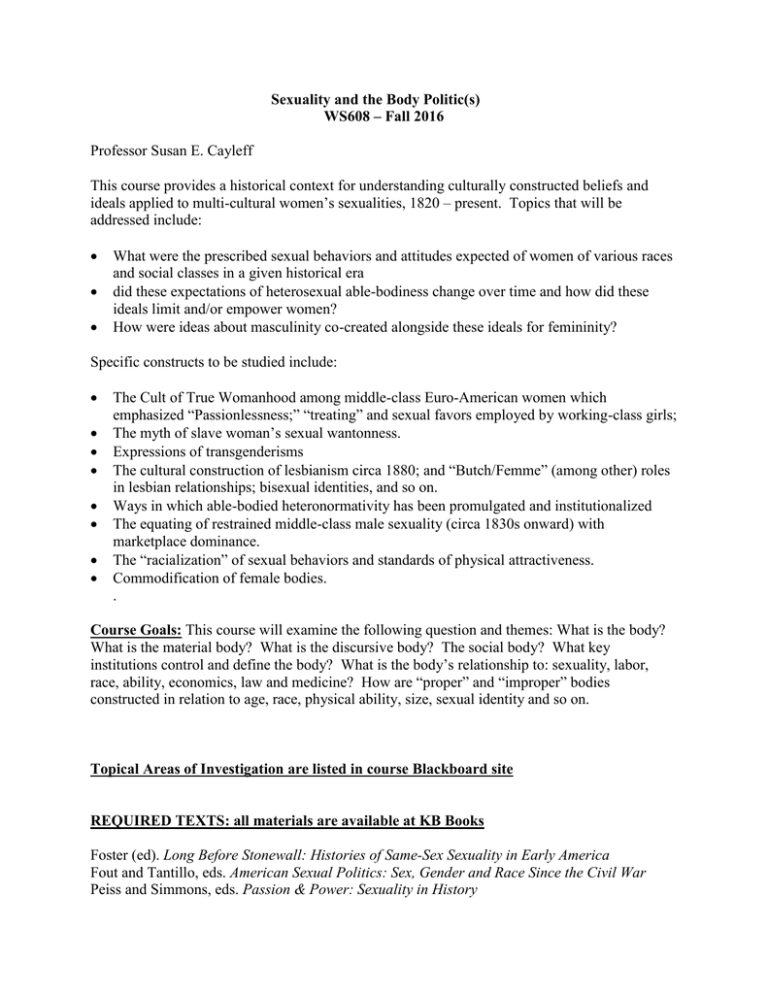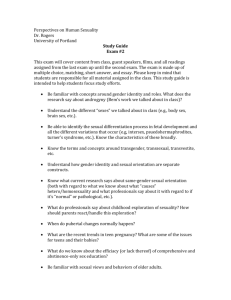Sexuality and the Body Politic(s) WS608 – Fall 2016
advertisement

Sexuality and the Body Politic(s) WS608 – Fall 2016 Professor Susan E. Cayleff This course provides a historical context for understanding culturally constructed beliefs and ideals applied to multi-cultural women’s sexualities, 1820 – present. Topics that will be addressed include: What were the prescribed sexual behaviors and attitudes expected of women of various races and social classes in a given historical era did these expectations of heterosexual able-bodiness change over time and how did these ideals limit and/or empower women? How were ideas about masculinity co-created alongside these ideals for femininity? Specific constructs to be studied include: The Cult of True Womanhood among middle-class Euro-American women which emphasized “Passionlessness;” “treating” and sexual favors employed by working-class girls; The myth of slave woman’s sexual wantonness. Expressions of transgenderisms The cultural construction of lesbianism circa 1880; and “Butch/Femme” (among other) roles in lesbian relationships; bisexual identities, and so on. Ways in which able-bodied heteronormativity has been promulgated and institutionalized The equating of restrained middle-class male sexuality (circa 1830s onward) with marketplace dominance. The “racialization” of sexual behaviors and standards of physical attractiveness. Commodification of female bodies. . Course Goals: This course will examine the following question and themes: What is the body? What is the material body? What is the discursive body? The social body? What key institutions control and define the body? What is the body’s relationship to: sexuality, labor, race, ability, economics, law and medicine? How are “proper” and “improper” bodies constructed in relation to age, race, physical ability, size, sexual identity and so on. Topical Areas of Investigation are listed in course Blackboard site REQUIRED TEXTS: all materials are available at KB Books Foster (ed). Long Before Stonewall: Histories of Same-Sex Sexuality in Early America Fout and Tantillo, eds. American Sexual Politics: Sex, Gender and Race Since the Civil War Peiss and Simmons, eds. Passion & Power: Sexuality in History Weitz, The Politics of Women’s Bodies: Appearance and Behavior All Blackboard readings are shown on the course site. EVALUATION METHODS REFLECTION ESSAYS ON TWO WEEKLY READINGS: DISCUSSION LEADER AND PRIMARY SOURCE ANALYSIS Some things to look for as you read: note the sources the historian uses: from what discipline(s) does the historian borrow to tell a story, or elaborate a point of view? What issues of power are discussed? How does the source address (or not address) issues of social class, queerness, differently abled bodies, ethnicity, race and urban v. non-urban life? Is the author convincing? What does the piece contribute to a history of that topic? To the history of sexuality? What lessons can be learned by present day Women’s Studies scholars? ON THE WEEK YOU FACILITATE: please locate one primary source relevant to your week’s content and offer a written (one page) verbal (2-3 minute) analysis of the insights it provides. Format for primary source analysis is on Blackboard SHORT PAPER (800-1000 word essay) You will choose one issue we have read/discussed to date. (Suggestions appear under “Specific Constructs,” page one of this syllabus, but can extend beyond these topics.) Specific instructions are on Bb. FINAL PAPER (15-16 pages) Specific instructions on Bb. Students select their topics by Week Six and submit a one-page proposal stating their topic and proposed source list to the professor. CRITIQUE of classmate’s final seminar paper: COMMUNITY ENGAGEMENT: TWO EVENTS COURSE SCHEDULE/ASSIGNED READINGS Week 1: Introduction/Course Mechanics WHAT IS “BODY POLITICS”? Handout/discussion: “The Geography of Desire”…adding to the map. Free write: “The female body is…My body is…” Week 2: Theories and Paradigms Lorde, AudreFoucault, M. Peiss and Simmons, eds., D’Emilio and Freedman, Week 3: September 10 Background to the 19th Century: The Sexed Body PadgugLorber, J. Week 4 Free write: create two lists: bodily euphemisms; reconceptualize female bodily functions FILM: TBA Week 5: The Racialized Body; Perspectives 1790-onward (and beyond) Free-write/ or draw. Saillant, John. Hoades. D’Emilio and Freedman. HirataWeek 6: October 1 Week 6: How Culture Constructs the Body: Women’s Bodies, Men’s Bodies in the 19th Century Mumford. Brown, T. Battam. **** Brief proposal of your final research paper due: It must include the following information: Statement of topic Era to be studied Race/ethnicity/sexual orientation/identity/social class, ablebodiness and geographic location relevant to your topic. 3-5 questions you will ask of the sources A complete bibliographic citation from 5 primary sources (from the era, first-person narratives, newspaper or then-contemporary print sources, etc.) and 6 secondary sources (scholarly/interpretive sources). Note: students are limited to two Internet sources unless the topic can be “placed” since 1990. If you are in doubt if your topic is “post 1990” please confer with the professor and be certain before submitting your proposal. Week 7: The Medicalized Body: 19th and 20th Century Experts Define and Control Sexuality Riessman. Barker-Benfield, G.JCushing, “Melancholia, Masturbation: Cured by the Removal of Both Ovaries” [R] G. Chauncey, Jr. Week 8: SHORT PAPER DUE Same Sex Intimacy Among Middle-Class Euro-American Women: The Controlled Body Smith-Rosenberg, C. Rich. Faderman. Week 9: *Prof. assigns Critique Partners Rebelliousness Bodies: Sexual Identities; Race and Social Class Dimensions; DifferentlyAbled Bodies Free-write/ or draw: draw your rebellious body Thomas, Carol Simson. Rodrique Halberstam Week 10: The Feared Body Mrozek, D Newton, E. Cayleff, Susan E: The Life and Legend of Babe Didrikson Zaharias, excerpts READER Shapiro, JP Week Eleven: * COMPLETED DRAFTS DUE TO YOUR CRITIQUE PARTNER. The Feared Body II: Kann, M.ark. Peiss, K Gonda, S. W. Chapkis Week Twelve: RETURN EDITED DRAFT TO CRITIQUE PARTNER “Reconfiguring” the “Imperfect” Body Lamm, Nomy. Kipnis, Laura. Shapiro,JP. Week 13: The Commodified Body Kaw, Eugenia Morgan, KP Taylor K. Davis Week 14 Film: TBA Week 15 ALL RESEARCH PAPERS DUE DURING CLASS TIME Reconceptualizing “Empowered” Bodies M.L. Felstiner. M. Scoby Weitz, R. Shevy Healey Week 16 December 10 Student presentations: 8-10 minutes max per student. Please use this format: 1. Why this topic? 2. Research questions 3. Theoretical framework 4. Content found 5. Analysis of sources’ usefulness 6. Questions for future study .


